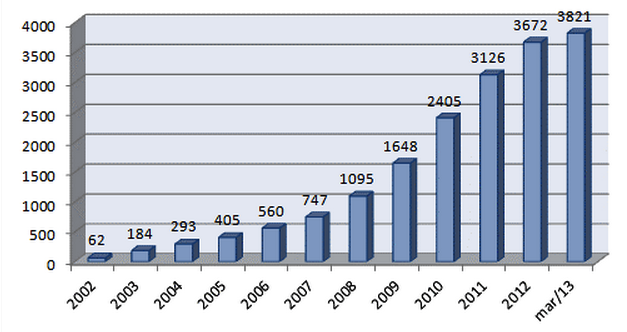On May 23, Brazil’s federal communications commission – ANATEL – passed a resolution with sweeping implications for internet service provision, net neutrality, and regulatory power. Resolution 614/2013 extends ANATEL’s regulatory reach from its traditional home in telecommunications systems all the way into the provision of internet services. This extension and others like it can significantly impact the internet access market in Brazil. These over-reaches also pose serious challenges to net neutrality policies pending in the Marco Civil legislation (known internationally as Brazil’s “Constitution for the Internet”).
At the Board meeting, the Board decided to include in its Regulation of Multimedia Communication Services (“SCM” – broadband networks) the principle of net neutrality via Resolution 614/2013. The resolution means that ANATEL now asserts that it has powers defined by the Brazilian Telecommunications Act to regulate and enforce network neutrality. And they made it clear they will not surrender this newly claimed power, despite the hope of civil society, policy makers, CGI and other market actors that such regulation would be under the auspices and policy making process of Marco Civil.
Resolution 614/2013 sits alongside ANATEL’s efforts with those of the Ministry of Communications[1] to change the scope of Norm 04 ( passed in 1995), which created and separately regulated components structure for Brazilian public telecommunications networks. If the desired changes come to pass, the large and dominant telecom companies would for the first time be able to enter, and extend their market dominance into, consumer internet services. This opens the door for a takeover of the policy agenda by telecom companies, and taken together with Resolution 614/2013, complicates Brazil’s traditional leadership role in debates in Brazil and international fora, including the International Telecommunications Union (ITU).
Brazil has been considered a pioneer in internet governance structure and processes since the creation of the Brazilian internet Steering Committee (CGI.Br) in 1995[2], and was cited in the Secretary-General’s Report to the World Telecommunications Policy Forum (WTPF) by a reference to Brazil’s ten “Principles for the Governance and Use of the Internet”[3].
CGI.Br formed under pressure from the academic and advocacy communities in Brazil, and was founded by a group of volunteers representing the core communities in internet governance: academia, technical community, government, civil society, access providers and telecoms, and representatives of the users. It is currently composed of 21 core advisors[4]. The mission of CGI.Br is to coordinate and integrate all Internet service initiatives in Brazil, as well as to promote technical quality, innovation and the dissemination of available services.
That mission was recognized by an early draft of the Marco Civil[5] – groundbreaking pending federal legislation that would guarantee civil rights in the use of the Internet and has been called a “Constitution for the Internet.” While early drafts expressly required CGI.Br to be consulted on net neutrality regulation in Brazil – the seventh largest country in Internet usage[6] – this requirement disappeared from later drafts after intense lobbying by telecommunications companies and ANATEL itself.
Taken together, Resolution 614/2013, the proposed changes to Norm 4, and the latest drafts of the Marco Civil move ANATEL into position as the core actor regulating net neutrality and internet providers in Brazil. This is a serious overreach of powers. It, and uses executive powers to gut the core legislative elements intended by the Marco Civil to guarantee multistakeholder debate and participation on internet policy.
It is also a significant change. SCM was born as a regulated service in 2001 based on ANATEL resolution 272, of August 9[7].Today it is synonymous with broadband in Brazil. SCM projections estimate that we will have 40 millions in Brazil in 2016, as per Marcelo Bechara presentation to the ANATEL Board.
SCM providers in Brazil. Source: http://www.teleco.com.br/scm_prest.asp
While at the beginning of the past decade, the major issue around SCM was how to tax the newly developed internet services in Brazil, today the debate over the definition of SCM is related to the reach of ANATEL’s regulatory power over the Internet. The change on article 3º of regulation 272/2001 created by new article 3º of resolution 614/2013 signals that clearly when adding, expressly, that SCM includes internet services. The new article 3º reads, in comparison to 3º of the 2001 resolution:
|
Art. 3º of Resolution 272/2001 |
Art. 3º of Resolution 614/2013 |
| “SCM is a service of fixed telecommunications of collective interest, provided nationally and internationally, in private regime, that makes possible the offer capabilities for transmission, emission and reception of multimedia information, by any means, a Signatories within a Service Provided Area.” | “SCM is a service of fixed telecommunications of collective interest, provided nationally and internationally, in private regime, that makes possible the offer capabilities for transmission, emission and reception of multimedia information, allowing, inclusively, the service of connection to the internet, by any means, a Signatories within a Service Provided Area.”
|
| Sole paragraph: Are Distinguished from the Multimedia Communication Services, the Fixed Switched Telephone Service for the use of the general public (PSTN) and the services of mass electronic communication, such as the Broadcasting Service, the cable television service, the service Multichannel Multipoint distribution (MMDS) and distribution Service Signs Television and Audio Signature by Satellite (DTH). | § 1 The provision of the SCM does not allow the transmission, emission or reception of information of whatever nature that may constitute the provision of broadcasting services, paid-TV and conditional access, as well as providing video signals and audio, wholeheartedly and simultaneously to Subscribers in the manner and conditions of the regulation of these services.
§ 2 In the provision of the SCM is not allowed to offer service with the characteristics of the Fixed Switched Telephone Service for the use of the general public (STFC), particularly the routing of telephone traffic through the network of SCM both originated and terminated in STFC networks.
§ 3 In the provision of the SCM is allowed to implement of restricted mobility functions established in the specific regulation of radiofrequency use. |
By approving this new regulation and pushing for the reform of the norm 04 of 1995, ANATEL increases the confusion of what is (or isn’t)a telecom or an internet service, and unilaterally asserts the power to regulate net neutrality outside the Marco Civil debate and later regulation process.
The process to change regulation of SCM started in ANATEL in 2008 and was made public in 2009. Three steps were involved, an internal consult (Consult n. 460), a public consult (Consult n. 45) and a public audience to “hear society”. 1443 contributions were sent, and 60% of those were from telecoms. The Council’s Marcelo Bechara published conclusions in early 2013 (in Portuguese[8]), where he asked for specific net neutrality regulation through the revised SCM regulation and has not mentioned once the role of CGI in contributing to this debate. It has also not mentioned the protests, resolutions and communications of CGI, published since 2011[9], against the proposed ANATEL reform.
Norm 04 of 1995 regulates the use of means/components the public network of telecommunications for the access to the Internet, and with other norms, differentiates what is a telecom services – and thus under the regulatory authority of ANATEL – and what are value added services – thus not under the regulatory authority of ANATEL. This was upheld by a decision of the Superior Justice Tribunal in 2002 regarding a tax case. That decision established that services of internet connections (SCI) are not telecom services, but are value added services[10]. The providers of SCI (PSCI) were, until this new ANATEL regulation, the actors technically responsible for the logical layer of the Internet. For ANATEL, the technological convergence means that SCM are able to do almost everything PSCIs do regarding connecting and managing the connection to the Internet, and PSCIs are left only services such as email and access to content.
The intention of ANATEL now is to extinguish norm 04/95, intention that has been protested by CGI.Br but also by the service providers in Brazil. ABRANET[11] has protested the moves with many communications to ANATEL and online protest, including putting a red bandage in its website[12]. One of the consequences of these moves, they assert, will be the concentration of internet service market power on the hands of a tiny group of Brazilian telecoms, who together account for almost 80% of broadband services in Brazil. ABRANET explains that while the number of SCM providers is increasing, the number of companies that actually take that service to the final consumer is very small[13]. This also has the potential to affect consumers due to market concentration and pricing. In a recent study, Brazil already appears in second place due to its high prices of broadband connection among 15 countries studied[14]. If the concentration of telecoms makes it to the “last mile” consumer, it will only get worse.
For ABRANET the “adoption of the new regulation” …”will mean the elimination of the isonomic treatment and the risk of unemployment of more than 150 000 direct and indirect workers in the sector. The new regulation allows companies that own the infrastructure, telecommunications companies, pass over 3,800 ISPs in Brazil and move directly to offer, in addition to broadband access, connection services – the service that is responsible for security and neutrality navigation”. For ABRANET such a change represents a step backwards regarding the Marco Civil debate.
Lost in all of this debate is the citizen, who loses most and fastest, but also the civil society that for many years has been fighting for internet freedom and net neutrality in Brazil.
NOTE: For a contrary opinion, see: Deregulation for a cheaper Internet (June, 3, 2013), By Cesar Mattos. Available (only in Portuguse) at http://www.telesintese.com.br/index.php/artigos-do-leitor/23097-desregulamentando-por-uma-internet-mais-barata
[1] NOTA TÉCNICA/MC/STE/DESUT/Nº 27/2011, with summary presented at Marcelo Bechara analysis available at http://www.anatel.gov.br/Portal/verificaDocumentos/documento.asp?numeroPublicacao=298286
[2] The Brazilian Internet Steering Committee (CGI.br) was created by Interministerial Ordinance 147, of May 31st, 1995, which was amended by Presidential Decree 4,829 of September 3rd, 2003
[4]For complete list see: http://www.cgi.br/english/about/members.htm
[5] The version of article 9 with reference to CGI.Br was:
“Art. 9º The party responsible for the transmission, commuting and routing of data has the obligation of granting equal treatment to every data package, regardless of content, origin and destination, service, terminal or application.
§ 1 The discrimination or degradation of traffic can only arise from:
I – technical requirements which are essential to the adequate rendering of the related service;
II – express request of the user;
III – priority to emergency services.
§ 2 In the case of discrimination or degradation of traffic established in subsection I of § 1, the person mentioned in the main section must:
I – inform users about the adopted traffic management practices;
II – respect the free competition;
III – refrain from causing unjustified damages to users.
§ 3 The regulation of cases of discrimination or degradation of traffic referred to in § 1 shall observe the recommendations of the Brazilian Internet Steering Committee – CGI.br.
§ 4º In the context of internet connection provision, either onerous or gratuitous, as well as in the transmission, switching and routing of data packets, it is prohibited to block, filter, analyze or otherwise monitor the content of data packets, with the exception of the cases admitted in law”. And for more information on Marco Civil refer to http://infojustice.org/archives/tag/marco-civil
[6]More statistics on Brazil at: http://internetworldstats.com/sa/br.htm
[7] Available at http://legislacao.anatel.gov.br/resolucoes/16-2001/5-resolucao-272. (Note that the resolution 614 from 05/23 has substituted this resolution from 2001)
[8] Available at: http://www.anatel.gov.br/Portal/verificaDocumentos/documento.asp?numeroPublicacao=298286
[9] http://www.direitoacomunicacao.org.br/content.php?option=com_content&task=view&id=8470
[10] Anatel presentation on Brazilian Internet Market, available at: http://www.anatel.gov.br/Portal/verificaDocumentos/documento.asp?null&filtro=1&documentoPath=202073.pdf
[11] http://www.abranet.org.br/
[12] http://www.abranet.org.br/index.php/2013-03-19-18-13-42/148-comunicado-23-05-2013
[13] http://www.abranet.org.br/index.php/2013-03-19-18-13-42/107-entrada-da-telebras-aumenta-concorrencia-no-mercado-de-banda-larga-a-r-35-no-brasil
[14] http://www1.folha.uol.com.br/mercado/2013/05/1278647-banda-larga-no-brasil-e-a-2-mais-cara-entre-15-paises-diz-pesquisa.shtml






